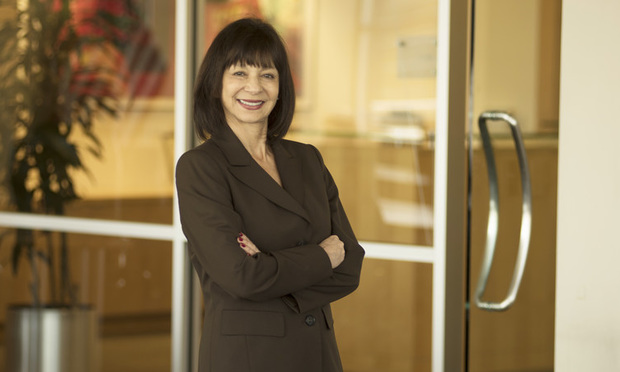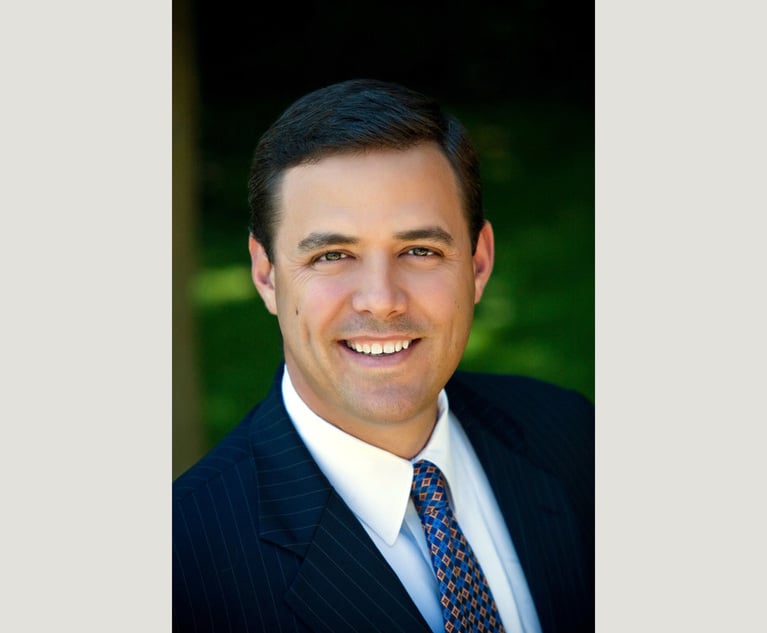Women Leaders in Tech Law: Juanita Brooks, Fish & Richardson
Brooks represented Gilead Sciences at the U.S. Court of Appeals for the Federal Circuit and won a precedential decision, but she listed a different case with a cherished peer as her favorite of the year.
November 04, 2019 at 07:30 AM
4 minute read
 Juanita Brooks, Fish & Richardson. Courtesy photo
Juanita Brooks, Fish & Richardson. Courtesy photo
Fish & Richardson's Juanita Brooks represented Gilead Sciences at the U.S. Court of Appeals for the Federal Circuit and won a precedential decision that not only clarifies the law regarding what is and is not business and litigation misconduct, but has changed how many technology companies handle due diligence and licensing negotiations. Brooks, who is among the 21 lawyers chosen by The Recorder as Women Leaders in Tech Law as part of this year's California Leaders in Tech Law and Innovation Awards, listed another of her cases as this year's favorite in discussing the year with The Recorder.
The Recorder: What's your proudest professional achievement of the past year and why?
Juanita Brooks: 2019 has had many highlights. However, I think that defending Illumina in Scripps Research Institute v. Illumina, prevailing first at the district court, and then at the Federal Circuit, was my proudest professional achievement. I worked closely on the case with Fish partner Craig Countryman, whom I was fortunate to work with on many matters over the years. He was a great lawyer and a dear friend. Craig was the architect of the winning strategy in the Illumina matter, and it was his victory of which I was proud to be a part. We lost Craig to cancer a few days before we received the Federal Circuit's decision.
What's your proudest personal achievement of the past year and why?
My proudest achievement is seeing both of my children's lives take off as they pursue their passions. This past year my son, Jai, moved to Los Angeles where he is pursuing his dream of becoming an electronic music producer. My daughter, Rose, who had been a lawyer in New York, also relocated to LA, where she is working on her Ph.D. with the goal of becoming a university professor.
What's one piece of advice you'd give to a woman starting out in tech law?
I would encourage women starting out in tech law to get involved in organizations that focus on the advancement of women in tech. One such organization is ChIPs, which stands for "chiefs in intellectual property," and was founded by several in-house women lawyers at tech companies. It is a fabulous organization where you can find other women doing what you are doing and feel supported and understood. I recently spoke at the ChIPs global summit, and to see almost 800 women in tech law all in one room was amazing and inspiring.
What concrete steps could be made to increase the number of women in tech law?
There are a lot of steps to be taken, and I am proud to say that at Fish, we are taking many. We have a 1L diversity fellowship program that provides annual fellowships to diverse law students, including women. Fish is one of 50 U.S. firms to have earned the highest designation of Mansfield 2.0 Certified Plus for successfully reaching at least 30% diverse lawyer representation in leadership roles and committees. We also participate in the OnRamp Fellowship program, which helps women reenter the legal profession after taking time off to be with their families. We start instilling the idea that women have a place in tech at a young age. Each year we send more than 30 middle school students to space camp, and many are girls.
The collective consciousness of the tech legal profession needs to be raised. With women not as visible in tech law as men, we all tend to default to putting teams together that are made up largely of men. Personally, I try to rethink each team and make an effort to put women on the team first.
This content has been archived. It is available through our partners, LexisNexis® and Bloomberg Law.
To view this content, please continue to their sites.
Not a Lexis Subscriber?
Subscribe Now
Not a Bloomberg Law Subscriber?
Subscribe Now
NOT FOR REPRINT
© 2025 ALM Global, LLC, All Rights Reserved. Request academic re-use from www.copyright.com. All other uses, submit a request to [email protected]. For more information visit Asset & Logo Licensing.
You Might Like
View All
How I Made Office Managing Partner: 'Stay Focused on Building Strong Relationships,' Says Joseph Yaffe of Skadden

US Patent Innovators Can Look to International Trade Commission Enforcement for Protection, IP Lawyers Say

How the Deal Got Done: Sidley Austin and NWSL Angel City Football Club/Iger
Trending Stories
- 1Uber Files RICO Suit Against Plaintiff-Side Firms Alleging Fraudulent Injury Claims
- 2The Law Firm Disrupted: Scrutinizing the Elephant More Than the Mouse
- 3Inherent Diminished Value Damages Unavailable to 3rd-Party Claimants, Court Says
- 4Pa. Defense Firm Sued by Client Over Ex-Eagles Player's $43.5M Med Mal Win
- 5Losses Mount at Morris Manning, but Departing Ex-Chair Stays Bullish About His Old Firm's Future
Who Got The Work
J. Brugh Lower of Gibbons has entered an appearance for industrial equipment supplier Devco Corporation in a pending trademark infringement lawsuit. The suit, accusing the defendant of selling knock-off Graco products, was filed Dec. 18 in New Jersey District Court by Rivkin Radler on behalf of Graco Inc. and Graco Minnesota. The case, assigned to U.S. District Judge Zahid N. Quraishi, is 3:24-cv-11294, Graco Inc. et al v. Devco Corporation.
Who Got The Work
Rebecca Maller-Stein and Kent A. Yalowitz of Arnold & Porter Kaye Scholer have entered their appearances for Hanaco Venture Capital and its executives, Lior Prosor and David Frankel, in a pending securities lawsuit. The action, filed on Dec. 24 in New York Southern District Court by Zell, Aron & Co. on behalf of Goldeneye Advisors, accuses the defendants of negligently and fraudulently managing the plaintiff's $1 million investment. The case, assigned to U.S. District Judge Vernon S. Broderick, is 1:24-cv-09918, Goldeneye Advisors, LLC v. Hanaco Venture Capital, Ltd. et al.
Who Got The Work
Attorneys from A&O Shearman has stepped in as defense counsel for Toronto-Dominion Bank and other defendants in a pending securities class action. The suit, filed Dec. 11 in New York Southern District Court by Bleichmar Fonti & Auld, accuses the defendants of concealing the bank's 'pervasive' deficiencies in regards to its compliance with the Bank Secrecy Act and the quality of its anti-money laundering controls. The case, assigned to U.S. District Judge Arun Subramanian, is 1:24-cv-09445, Gonzalez v. The Toronto-Dominion Bank et al.
Who Got The Work
Crown Castle International, a Pennsylvania company providing shared communications infrastructure, has turned to Luke D. Wolf of Gordon Rees Scully Mansukhani to fend off a pending breach-of-contract lawsuit. The court action, filed Nov. 25 in Michigan Eastern District Court by Hooper Hathaway PC on behalf of The Town Residences LLC, accuses Crown Castle of failing to transfer approximately $30,000 in utility payments from T-Mobile in breach of a roof-top lease and assignment agreement. The case, assigned to U.S. District Judge Susan K. Declercq, is 2:24-cv-13131, The Town Residences LLC v. T-Mobile US, Inc. et al.
Who Got The Work
Wilfred P. Coronato and Daniel M. Schwartz of McCarter & English have stepped in as defense counsel to Electrolux Home Products Inc. in a pending product liability lawsuit. The court action, filed Nov. 26 in New York Eastern District Court by Poulos Lopiccolo PC and Nagel Rice LLP on behalf of David Stern, alleges that the defendant's refrigerators’ drawers and shelving repeatedly break and fall apart within months after purchase. The case, assigned to U.S. District Judge Joan M. Azrack, is 2:24-cv-08204, Stern v. Electrolux Home Products, Inc.
Featured Firms
Law Offices of Gary Martin Hays & Associates, P.C.
(470) 294-1674
Law Offices of Mark E. Salomone
(857) 444-6468
Smith & Hassler
(713) 739-1250







